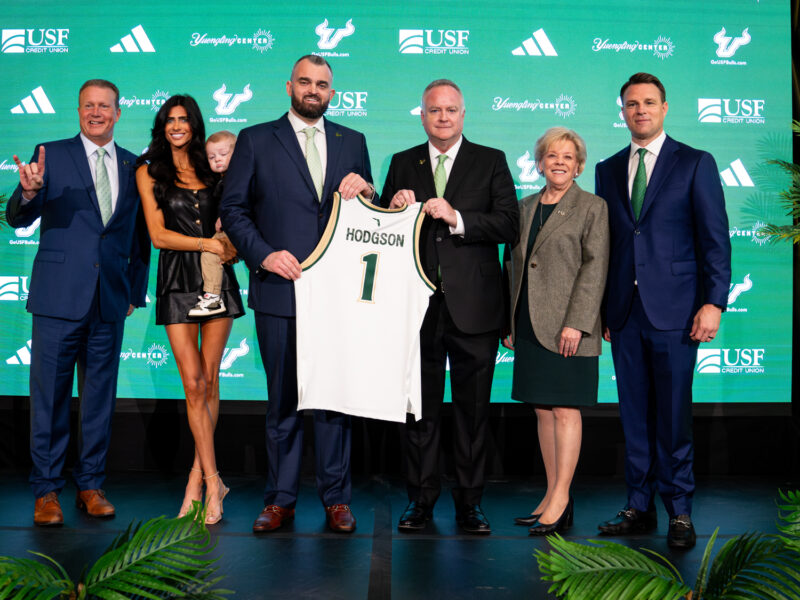
By Nancy McCann
In a stinging put-down of St. Petersburg, the Faculty Senate in Tampa has urged the USF system Board of Trustees to oppose making St. Petersburg and Sarasota-Manatee branch campuses under consolidation in 2020.
A Feb. 22 memo to the trustees says the senate “voted overwhelmingly” to oppose the Consolidation Task Force’s recommendation that the two smaller campuses become branch campuses as defined by accreditors.
Giving St. Petersburg and Sarasota-Manatee that designation “would threaten USF’s preeminent status,” the memo says, and “fails to establish a clear, simple and unified leadership structure by aligning accountability with authority.”
The Tampa senate, which has 83 members, calls itself “the primary faculty advisory body” to Tampa-based USF system administrators.
The memo prompted strong rebukes from the president of the Faculty Senate in St. Petersburg and the regional chancellor in Sarasota-Manatee.
The memo “offers a condescending and ultimately insulting characterization of the faculty members, administrators and staff assigned to campuses outside of Hillsborough County,” said Ray Arsenault, a professor of history and president of the St. Petersburg Faculty Senate.
It is “based on a series of false and misguided assumptions about the relationship between academic excellence and corporate-style authority,” said Arsenault.
“Preeminence is a laudable goal, but slavish adherence to legislatively created metrics which are subject to revision or even eventual abandonment will not serve us well.”
The Tampa memo is “demeaning to our faculty,” said Karen Holbrook, the Sarasota-Manatee regional chancellor. “It’s disappointing because we are all colleagues and we would all benefit from working together. It isn’t just Tampa coming to our campus. We have a lot to offer.”
The reaction of Martin Tadlock, the regional chancellor in St. Petersburg, was more cautious.
“While I respect the right of the Tampa faculty to express their opinion, I am surprised they waited so late in the process,” he said. “The task force provided many opportunities for input, and USFSP faculty members participated in those extensively.”
The back-and-forth across the three campuses comes as the trustees begin weighing how to consolidate them into a single, unified university as mandated by the Legislature last year.
The Legislature’s decision to abolish the independent accreditation of St. Petersburg and Sarasota-Manatee prompted an outcry among many on the St. Petersburg campus and their allies in the Pinellas business and political communities.
Now, amid the verbal jousting on the three campuses, legislators have signaled that they – not the trustees – may provide the final word on what ultimately happens to St. Petersburg and Sarasota-Manatee.
Both Rep. Chris Sprowls, the Palm Harbor Republican who chairs the powerful House Rules Committee, and Bill Galvano, the Bradenton Republican who is president of the Senate, have endorsed the Consolidation Task Force’s report.
And under legislation filed in both houses this month, St. Petersburg and Sarasota-Manatee would become branch campuses, although the term “branch campus” is not defined.
***** ***** *****
In the conundrum called consolidation planning, the organization of the two smaller campuses must be determined before finalizing important decisions about colleges, schools, programs and finances.
There are a lot of moving parts on the subject of academic structure.
The Consolidation Task Force, which was created by the Legislature to advise the trustees, recommends that St. Petersburg and Sarasota-Manatee become branch campuses as defined in regional accrediting standards.
This means the two campuses would have their own budgetary and hiring authority and their own faculty and administrative organization.
The only alternative under the accreditation umbrella is becoming an instructional site with little control over campus identity – an unacceptable outcome to supporters of the St. Petersburg campus.
USF system President Judy Genshaft has not embraced the task force’s recommendation for branch campuses. She told the trustees at their last meeting that examples need to be studied that are “somewhere in-between” a branch campus and an instructional site.
The Consolidation Implementation Committee, made up of administrators, professors and staff from the three campuses, was created by the trustees and Tampa administrators to work in private while the task force met in public.
In its report, the CIC uses the term “regional campuses” to refer to St. Petersburg and Sarasota-Manatee, but says this is not meant to be a recommendation.
Meanwhile, a report from around 20 “clusters” of faculty from the three campuses – formed in haste at the beginning of the year to provide further input on consolidation – has not yet surfaced.
The next meeting of the trustees is scheduled for March 5 at the Tampa campus. They have until March 15 to submit a consolidation plan to the Board of Governors of the State University System of Florida.
Members of the USF administration have said it is not expected that the trustees’ plan will have final details on whether St. Petersburg and Sarasota-Manatee should be branch campuses.
This is Ray Arsenault’s reaction to the memo from the Tampa Faculty Senate. Arsenault is president of the St. Petersburg Faculty Senate.
“The USF Tampa Senate’s letter to the Board makes an extended argument for hyper-centralization that is based on a series of false and misguided assumptions about the relationship between academic excellence and corporate-style authority. These assumptions fly in the face of the university’s success as a system.
“Preeminence is a laudable goal, but slavish adherence to legislatively created metrics which are subject to revision or even eventual abandonment will not serve us well. The great strides forward at USFSP during the past 15 years testify to the wisdom of shared governance and a certain level of local autonomy and identity.
“The USF Tampa letter, using the rationale of streamlined administration and enhanced metrics, offers a condescending and ultimately insulting characterization of the faculty members, administrators, and staff assigned to campuses outside of Hillsborough County. Let us hope that the Board of Governors has the collective wisdom and experience to recognize and reject the USF Tampa Senate’s dismissive attitude towards their outlying colleagues.”




The USF-Tampa faculty were not informed about this letter before it was submitted. This is a faculty Senate action. This letter does not speak for me. As a 25 year member of the Tampa faculty I and my students have experienced the richness of intellect and creativity provided USF-Tampa by USFSP and USFSM. The argument that pre-eminence would be threatened is false. For excellence see the career of the USFSP Faculty Senate president, Raymond Arsenault: https://www.usfsp.edu/hp/full-time/raymond-arsenault/
Kathleen de la Peña McCook (writing for herself)
Distinguished University Professor
School of Information